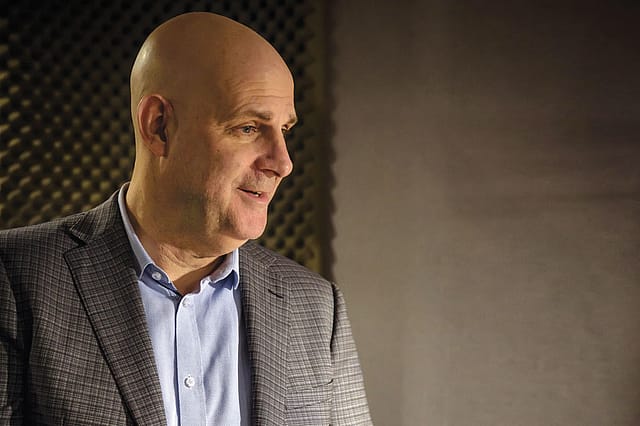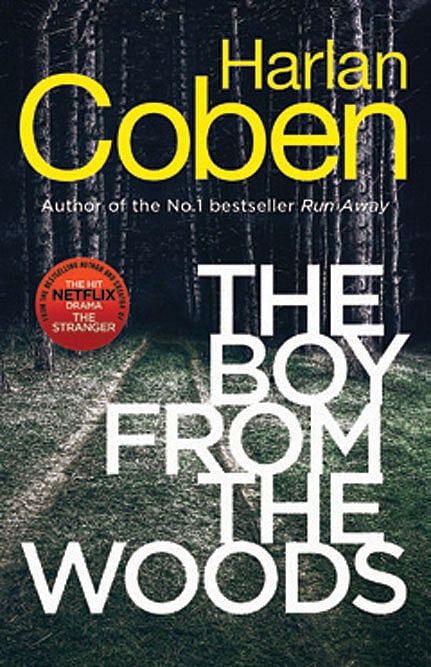Harlan Coben: ‘I like starting with a placid lake. I can then just drop a small pebble and see what happens’

SOMETIME LAST YEAR, the bestselling writer Harlan Coben found himself hiking through the woods in New Jersey in the US, when he chanced upon a young boy wandering by himself. “I was getting really bored,” he tells Open. “I was looking for a coffee shop or a bookshop or something, but all I got was more trees. And then I see this little boy and I think to myself, ‘What if?’”
That is the question Coben is always looking for. All his ideas for books, he says, stem from that question. In this case, much of the book’s premise presented itself to him during that hike. “What if a boy comes out of the woods and no one knows where he came from? He swears he’s always lived [in the woods], broke into houses to survive or whatever. And what if 30 years pass, he’s an adult now, and he still has no idea who his parents are,” Coben says. “And then another child goes missing in those woods and he has to find them.”
A year later—right on time according to Coben’s publishing schedules—the premise has delivered Coben his 32nd book, The Boy from the Woods (Random House; 384 pages; Rs 599).
Inside The Boy from the Woods, Coben is introduced not as a writer of books but as a ‘multi-media entertainment brand’. The publisher’s enthusiasm is understandable. Coben ranks among the top-tier crime thriller writers of this generation. His numbers are staggering. This is his 32nd book in around 30 years, his advance is rumoured to be in the high seven figures and there are over 70 million copies of his books in 43 languages currently in print worldwide.
2026 Forecast
09 Jan 2026 - Vol 04 | Issue 53
What to read and watch this year
His books follow something of a ritual. They arrive almost always around this time of the year and slot themselves right into the bestseller lists. He isn’t just a Number One bestseller. As the book reminds you, he is a guaranteed Number One bestseller.
Coben has an imposing presence. In his late fifties now, he’s entirely bald and towers at nearly six and a half feet. In the Netflix show The Stranger (based on his book), he appears briefly seated in a chair, his quiet presence taking up the entire scene. Over the phone, he is pleasant and amiable. “You know I happened to be over [in the UK where the show was created] and we thought it would be funny to do it,” he says. “We had no idea what I was going to do and someone said, ‘Oh, you know, we need someone to sit on this desk.’”
Coben wasn’t always very successful. He didn’t even consider writing as a career, he says. After he graduated from college, he worked as a tour guide in Spain for his grandfather’s travel agency. Being a tour guide in a distant country prompted him to commit those experiences to paper. “I thought it would be interesting to write something about that,” he says. “And when I did, I hated what I was writing.”
The first book,he says, was self-absorbed, pretentious and overwritten. Coben couldn’t even find a publisher. “But you know what, I caught the coronavirus bug of writing,” he says. He locked up his unpublished manuscript and decided to write crime novels instead. “People call it the mystery of crime, I call it the novel of immersion, the book you have to keep reading and can’t put down,” he says.
Coben’s early books were moderate successes. A cult following developed around his Myron Bolitar series, where the protagonist is a washed-up sports agent who gets pulled in again and again to solve mysteries. It was only with his 10th book, Tell No One (2001), where he found real fame. That book—about a paediatrician mourning the death of his wife who receives an anonymous email many years later that appears to show his wife on a recent CCTV footage—became an instant bestseller. Five years later, it was adapted into an equally thrilling and moving French film with the same title. Not only did the book give him fame, it arguably also gave him the template for all his future books.
Crime-thriller critics argue that Coben’s early books are mystery novels, where the solving of the crime moves the book forward. With and after Tell No One, a majority of his books were stand-alone thrillers where it is the crime itself that propels the book. Although Coben doesn’t agree with these distinctions, there is also another thematic consistency. They are almost always set amidst pleasant suburban neighbourhoods (usually in New Jersey, the place Coben was born and still resides in) featuring commonplace families who are suddenly threatened by the revelation of a hidden secret.
To Coben, a thriller set around a family living in a small pleasant neighbourhood is always an intriguing pull for the reader. “The family is fascinating to write about because it’s something we can all relate to and something we all care about. So if I ask you ‘Will you kill somebody?’, the answer’s ‘No’. But will you kill to save your child?” he asks. “It’s like having a really placid lake. You throw a stone and it’s gonna make ripples. Throw it in choppy waters and you won’t even notice. So I like starting with that placid lake. I can then just drop a small pebble and see what happens.”
In many ways his latest novel, The Boy from the Woods, falls within that same category. The protagonist here, Wilde, isn’t an ordinary suburban householder. In fact, after being discovered as a feral child and getting adopted, he goes on to work in the military and as a private investigator, but remains something of a social misfit and continues to retreat into the woods. But he is motivated by the same impulses of all other Coben protagonists: the need to protect his family (in this book, a surrogate family).
The canvas is also larger. It’s the same small New Jersey neighbourhood where two kids go missing, but there is also a larger plot involving the presidential campaign of a Donald Trump-like vile reality TV figure. Coben says he felt compelled to have a character like that. “My books are contemporary. I like to reflect what’s going on in society, which right now is a lot of extremism, a lot of misinformation, social media getting more and more intense, and manipulation. And so I wanted to reflect that—not in the right or left wing way, not in the Republican or Democratic way, but in a way that we could all sort of see and take a step back and look at it,” he says.
The book carefully circumvents the need to explain the politics of the Trump-like figure. We know he was in TV and that he is vile. But we never really know what his political preferences and ideology are. “Well that’s because I don’t write political books,” Coben explains. “I want you to be entertained. My job is to let you escape all the terrible things.”
The book has all the Cobenesque features. There are sharp plot twists; several contemporary gadgets, from high-end surveillance equipment and phone-tracing gizmos to genealogy tracing services; and you get that distinct sense that he delights in subverting the genre. If in the TV version of The Stranger (where Coben served as executive producer), the buddy-cop trope is turned upside down with a chatty black and gay detective teaming up with a dour female colleague, here in this book, a large part of the story is taken up by the love affair between two septuagenarians: a tough-as-nails lawyer and her equally old and hardboiled paramour who serves as the local cop.
THE MOST ASTONISHING aspect of Coben’s work is how prolific he is. Even by crime books’ standards, he is fast. He has had a book out almost every year ever since he was first published; sometimes there are even two books in a single year.
Unsurprisingly, he works, according to a calendar schedule. He begins sometime in January: once he’s had a ‘what if’ brainwave and has both the beginning and the end in place, with an aim to turn in the book by his October deadline. March is left free for interviews and promotions for the book. On the day I reach him at his residential phone, he informs me that he has been freed up for interviews with international journalists.
He isn’t however very disciplined. “I don’t do 2,000-word goals or anything like that,” he says. “I just write wherever: sometimes very little but sometimes a lot.” He makes up for whatever time he has lost in the last few days. “I’m a monkey almost in a fugue state. I’m in a hold. I keep going, going and going,” he says. For The Boy in the Woods, the last 50 pages were written in a single day.
“I don’t know whether the process [of writing] is artistic or beautiful or any of that. I feel I’m best off if I treat it like the job. The plumber can’t wake up one day and say, ‘Oh, I can’t do pipes today,’” he says.
But as tight as his writing schedules are throughout the year, there’s one new avenue that in the last few years has begun to take up his time: TV.
Ever since Tell No One was made into a French movie, film and TV producers have come to realise that his suburban thrillers translate well on to the screen. His books fit in with the binge-watching culture of the Netflix age. Two years ago, he got into a five-year-long 14-project deal (both for older and future titles and for original ideas) with Netflix to adapt his novels into TV series or films. One of them, The Stranger (based on his 2015 eponymous novel) aired earlier this year. Two more, for Netflix Poland and Netflix Spain, are currently in production.
Coben is deeply involved in these projects, especially in the English language-based ones. “What ends up happening is that writing is very lonely,” he says. “So when I go on the set for example, for a few days, I’m very happy and then I start to lose my mind and need to be alone. So I rush home and I lock myself in my room and I write. And then when I’m lonely, I can go back out and do the other thing [for the TV production]. So they kind of feed off each other.”
But doesn’t all this involvement on the shows come in the way of his writing? Would he rather not leave the work of the adaptation entirely to the production house? “You know, when I’m doing a book, I’m everything. It is like sports. You are the tennis player, the golfer, you’re by yourself, you win a tournament, you celebrate by yourself,” he says. “But when you do a TV show, it’s like being the captain of the football team.”

